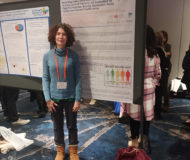

Dr. Carmen García-Sánchez, neuropsychologist at the Neurology Service of Sant Pau Hospital and researcher at the Sant Pau Research Institute (IR Sant Pau), has presented the findings of a study on persistent COVID-19 and the potential relationship between body mass index and cognitive performance at the 52nd Annual Congress of the International Neuropsychological Society, recently held in New York (United States).
The study, titled “Body Mass Index (BMI) and Psychological Health in Long-COVID-19 Patients: An Exploration of Cognitive Function, Anxiety, Depression, Apathy, Fatigue, and General Health Status,” was conducted on a total of 118 patients with persistent COVID-19, aiming to analyze the potential association between body mass index (BMI) and cognitive performance, anxiety, depression, apathy, and fatigue among these individuals. The study also explored whether BMI influences the overall health perception of these patients. The results obtained by the research team have shown that BMI may not be a direct determinant of these psychological aspects in the context of prolonged COVID-19.
According to Dr. Carmen García-Sánchez, fatigue has been associated “with medical conditions such as post-viral infections or neurological diseases. But there is no universally accepted definition of this clinical condition, and our knowledge of its underlying pathogenic mechanism is limited, which is why it represents a clinical challenge for experts.”For this reason, “it is necessary to thoroughly assess the sequelae in post-COVID-19 patients and continue studying their evolution to reduce cognitive deterioration and promote recovery.”
This new study presented at the Congress of the International Neuropsychological Society represents another step in the research line developed by IR Sant Pau, which has already published other studies revealing a connection between fatigue, depression, anxiety, and other cognitive deficits in patients with post-COVID syndrome. One of them, published in the journal Brain and Behavior, showed that the disease had a widespread impact on attention skills, executive functions, learning, and long-term memory. And another, published in the Journal of Neurology, revealed that fatigue in post-COVID patients was associated with anxiety, depression, and apathy.